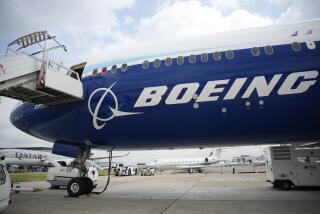Next Moves Will Test McDonnell’s Mettle
- Share via
The decision by McDonnell Douglas’ chief executive, Harry C. Stonecipher, to stop pouring cash into its withering commercial jetliner group was the type of tough call that McDonnell wanted from Stonecipher when it hired him two years ago.
But it wasn’t his first, and it won’t be his last.
Stonecipher has his hands full with the other 80% of McDonnell Douglas--its defense side--where crucial Pentagon decisions, executive turmoil, fiercely competitive foreign sales and McDonnell’s search for a big acquisition are testing his mettle.
“They have the greatest range of issues facing them of any company in the business,” said Byron Callan, an analyst with Merrill Lynch & Co.
Meanwhile, the city of Long Beach was sorting out the stunning announcement he made Monday: That McDonnell will abandon hope of reestablishing its Douglas Aircraft Co. division as a major manufacturer of jetliners.
With about 10,000 people building its airliners in Long Beach, Douglas is the city’s biggest industrial employer. Yet Stonecipher decided that Douglas won’t spend the billions necessary to develop new families of jetliners that would make Douglas a serious rival of industry leaders Boeing Co. and Europe’s Airbus Industrie. So Douglas is left selling its existing models.
City officials kept their chins high, noting that Douglas still has 200 airplanes on back order.
“I am always concerned when a decision like that is made,” said Mayor Beverly O’Neill, who was told of Stonecipher’s decision Monday in a letter from Douglas President Michael Sears. “But I can’t say that I am alarmed by it.
“Some of the analysts say it’s the demise [of Douglas], but I don’t agree with them at all,” O’Neill said.
St. Louis-based McDonnell manufactures for the military F/A-18 and F-15 fighter jets, C-17 cargo planes, AH-64 Apache attack helicopters, and Harpoon and Tomahawk cruise missiles. It also makes space equipment, including Delta launch rockets.
The company also is thriving. After flirting with bankruptcy in the early 1990s, McDonnell is on pace to post record profits again this year. In the first nine months of 1996 it earned $581 million on sales of $9.7 billion. The company’s stock--which closed at $53 a share Tuesday, up $1, on the New York Stock Exchange--has rocketed from $6 a share in 1992 after adjusting for splits.
But the burly Stonecipher, who spent most of his career selling General Electric jet engines before arriving at McDonnell, faces plenty of challenges.
Last weekend he fired Herbert Lanese, head of McDonnell’s powerful military aircraft and space group, because the two clashed repeatedly over the company’s direction. “I was a little tired of having arguments about many of these items,” Stonecipher told analysts in a conference call Monday.
“Stonecipher needs to move quickly to replace Lanese,” said Jon Kutler, president of Quarterdeck Investment Partners, a Los Angeles investment firm specializing in aerospace. “Lanese’s departure is a big hole.”
Moreover, Lanese’s ouster came only three weeks before McDonnell faces a pivotal decision by Uncle Sam. The Defense Department is set to pick the two competitors that will vie to build the next-generation U.S. fighter jet, dubbed the joint strike fighter.
The JSF award, potentially worth tens of billions of dollars to the winner, is among the richest plums ever offered by the Pentagon and Lanese has said “we’ll be devastated” if McDonnell is eliminated from the competition.
Andrea Shen, an analyst at Lehman Bros., said “there’s no reason why they [McDonnell] shouldn’t be” among the two finalists. “If McDonnell doesn’t get it, it would be a huge upset,” she said.
Stonecipher also wants to make a big acquisition in the defense-electronics field if it hopes to stay on top of the industry. Yet McDonnell has largely sat out the industry’s merger spree of recent years, and some analysts are frustrated with Stonecipher’s pace.
“When defense consolidation is going on, he needs to participate,” Shen said. “That’s the next biggest action he needs to take.”
More to Read
Inside the business of entertainment
The Wide Shot brings you news, analysis and insights on everything from streaming wars to production — and what it all means for the future.
You may occasionally receive promotional content from the Los Angeles Times.











